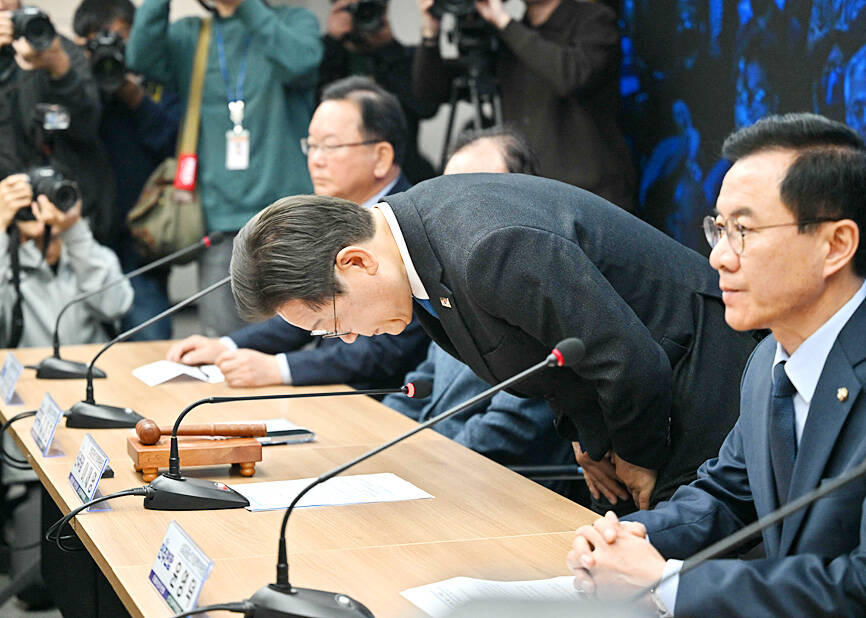South Korea’s opposition was heading toward a landslide victory in Wednesday’s parliamentary elections, exit polls indicated, in a major blow to President Yoon Suk-yeol.
The outcome, if confirmed, would at the very least leave Yoon as a lame duck for the three remaining years of his term in office, and could even open the way for his impeachment.
The Democratic Party of Lee Jae-myung — survivor of a January knife attack by a disgruntled voter — and its satellites are forecast to win as many as 197 seats, up from 156 in the last parliament.

Photo: AFP
Yoon’s People Power Party and its partner were projected to be trailing on between 85 and 99 seats, down from 114, the exit polls conducted by three major broadcasters indicated.
All opposition parties combined might even secure a super-majority of 200 in the 300-seat parliament, which could in theory allow them to attempt to remove Yoon from office before his term ends in 2027.
That includes the new Rebuilding Korea party, led by former South Korean minister of justice Cho Kuk, which capitalized on discontent with the two main parties to pick up a projected 12 to 14 seats.
“The people have won, the will to judge the Yoon Suk-yeol administration is very clear,” Cho said after the vote, local media reported.
On the campaign trail, he vowed to make Yoon “first a lame duck, then a dead duck.”
“The figures today show the strong anger of people at Yoon for his two-year governance,” political analyst Yum Seung-yul said.
Yoon beat Lee in South Korea’s closest-ever presidential election in 2022 and has taken a tough line with the nuclear-armed North while improving ties with Washington and former colonial occupier Japan.

‘TAIWAN-FRIENDLY’: The last time the Web site fact sheet removed the lines on the US not supporting Taiwanese independence was during the Biden administration in 2022 The US Department of State has removed a statement on its Web site that it does not support Taiwanese independence, among changes that the Taiwanese government praised yesterday as supporting Taiwan. The Taiwan-US relations fact sheet, produced by the department’s Bureau of East Asian and Pacific Affairs, previously stated that the US opposes “any unilateral changes to the status quo from either side; we do not support Taiwan independence; and we expect cross-strait differences to be resolved by peaceful means.” In the updated version published on Thursday, the line stating that the US does not support Taiwanese independence had been removed. The updated

‘CORRECT IDENTIFICATION’: Beginning in May, Taiwanese married to Japanese can register their home country as Taiwan in their spouse’s family record, ‘Nikkei Asia’ said The government yesterday thanked Japan for revising rules that would allow Taiwanese nationals married to Japanese citizens to list their home country as “Taiwan” in the official family record database. At present, Taiwanese have to select “China.” Minister of Foreign Affairs Lin Chia-lung (林佳龍) said the new rule, set to be implemented in May, would now “correctly” identify Taiwanese in Japan and help protect their rights, the Ministry of Foreign Affairs said in a statement. The statement was released after Nikkei Asia reported the new policy earlier yesterday. The name and nationality of a non-Japanese person marrying a Japanese national is added to the

AT RISK: The council reiterated that people should seriously consider the necessity of visiting China, after Beijing passed 22 guidelines to punish ‘die-hard’ separatists The Mainland Affairs Council (MAC) has since Jan. 1 last year received 65 petitions regarding Taiwanese who were interrogated or detained in China, MAC Minister Chiu Chui-cheng (邱垂正) said yesterday. Fifty-two either went missing or had their personal freedoms restricted, with some put in criminal detention, while 13 were interrogated and temporarily detained, he said in a radio interview. On June 21 last year, China announced 22 guidelines to punish “die-hard Taiwanese independence separatists,” allowing Chinese courts to try people in absentia. The guidelines are uncivilized and inhumane, allowing Beijing to seize assets and issue the death penalty, with no regard for potential

‘UNITED FRONT’ FRONTS: Barring contact with Huaqiao and Jinan universities is needed to stop China targeting Taiwanese students, the education minister said Taiwan has blacklisted two Chinese universities from conducting academic exchange programs in the nation after reports that the institutes are arms of Beijing’s United Front Work Department, Minister of Education Cheng Ying-yao (鄭英耀) said in an exclusive interview with the Chinese-language Liberty Times (the Taipei Times’ sister paper) published yesterday. China’s Huaqiao University in Xiamen and Quanzhou, as well as Jinan University in Guangzhou, which have 600 and 1,500 Taiwanese on their rolls respectively, are under direct control of the Chinese government’s political warfare branch, Cheng said, citing reports by national security officials. A comprehensive ban on Taiwanese institutions collaborating or